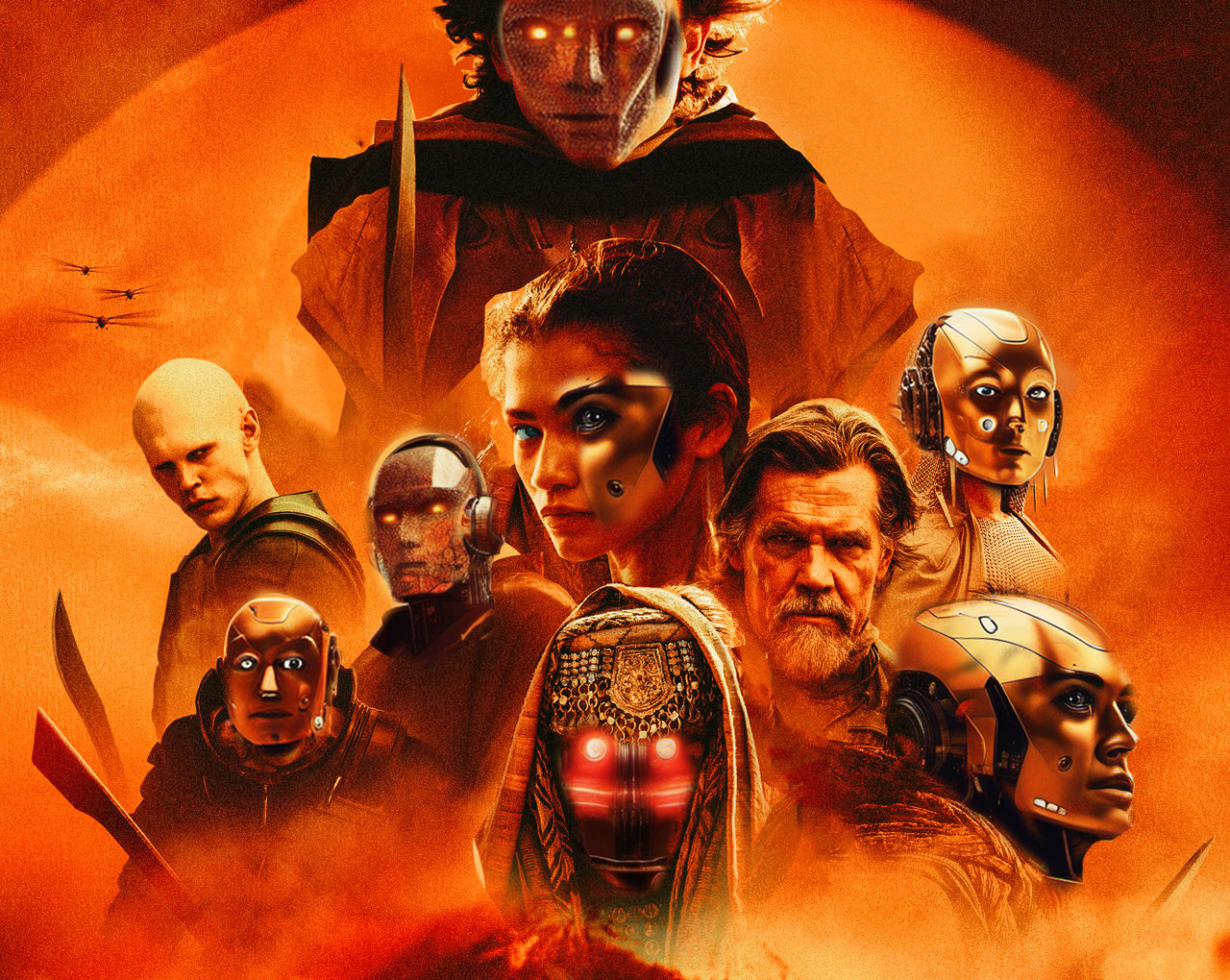Maybe I’m idealistic, but I’ve always imagined a world where AI liberates us from the tedium of work, freeing up our time to pursue human expression and the higher arts. I’ve assumed that creatives would be insulated – that they would be the last in the firing line. Now, I’m not so sure.
A few weeks ago, I was lucky enough to attend a pre-screening of Dune: Part Two. I’m no critic, but I can confirm that the film is absolutely epic. The director (Denis Villeneuve) is known for making visually inventive, sensitive, and unflinching films. It’s very clear with this sci-fi blockbuster, that he’s at the top of his game.
The film is a faithful adaptation of the self-titled novel “Dune” by Frank Herbert, first published in 1965, a science fiction classic that transports the reader to the fictional desert planet of Arrakis (aka Dune) tens of thousands of years into the future.
It’s a multi-layered work that explores themes of politics, religion, ecology and the human experience. But there’s a cautionary sub-narrative that is largely missing from the films. The Orange Catholic Bible (OCB), the key religious text in the Dune universe, forbids the creation of machines that imitate human thinking: “Thou shalt not make a machine in the likeness of a man’s mind.”
There are no computers, robots, or AI in Dune because their universe has already gone through the full cycle of man vs machine – an age-long intergalactic war between humans and artificial intelligence “the god of machine logic” that ends in the total destruction (and ongoing ban) of thinking machines.
“Humans had set those machines to usurp our sense of beauty, our necessary selfdom out of which we make living judgments.” – Leto II (God Emperor of Dune).
So, as I sat marvelling at the film – the culmination of so much vision and talent – I couldn’t help but think about Frank Herbert’s foresight, the inexorable creep of AI, and the uncertain future it poses for creatives.
That very same day, OpenAI, the US-based AI research organisation, had just announced ‘Sora’ – a generative AI model that can create realistic and imaginative scenes from text instructions. Not only does the model understand what the user has asked for in the prompt, but also how those things exist in the physical world.
Experts have hailed Sora as a major milestone in the development of artificial intelligence. It has caused widespread astonishment (and quite a lot of anxiety) with its ability to produce up to a minute of realistic footage from simple text prompts.
To put things into perspective … here’s a (now viral) video generated by open source “text2video” ModelScope AI in March 2023.

And here’s a video generated by Sora less than a year later.

Sora is just the latest example of many Generative AI tools that are taking on the creative category; text to image (ie. Midjourney), text to music (ie. MusicML), text to talking, singing, speaking (ie. Emote), text to games (ie. GenieAI)… the list goes on.
The questions posed by Generative AI are consequential (if not existential) for creatives. These tools have put the power of creation in the hands of anyone able to type a description. On the one hand, this can only be a good thing – equal, affordable opportunity for everyone. Just imagine the kind of talent that might emerge if a kid has the same access to visual effects as a Hollywood studio?
On the other hand, and as evidence is already showing, this democratisation comes hand-in-hand with the enshittification of absolutely everything. I know there’s no such thing as an original idea — that everything is a copy, but with so much mediocre content, it’s really starting to feel like everything is derivative.
AI junk is already clogging the internet – filling it up with “zombie content” designed to game algorithms and scam humans. It’s becoming a place where bots talk to bots, and search engines crawl a lonely expanse of pages written by AI.
Amazon is flooded by shitty AI-generated books. Twitter has a bot problem, Linkedin is a minefield of pointless posts and you can’t move for fake news – NewsGuard has so far identified 725 AI-generated news and information sites operating with little to no human oversight.
“Even a man’s exact imitation of the song of the nightingale displeases us when we discover that it is a mimicry, and not the nightingale.” — Immanuel Kant.
What gives me comfort is that even with open access to all these tools, I still believe creativity will reside with creatives. Human expression is hard work! The tough part of creating content is crafting something from nothing. The truth is that most people don’t know what they want, and definitely can’t actualise their desires.
It is extremely difficult to create something from scratch or even just articulate an idea compared to picking among choices. It’s hard enough to decide what to watch on Netflix! I have faith that most people will prefer to take the less energy-intensive route and leave creativity to the professionals.
I just hope that creatives will continue to strive for their art – I have no doubt it’s extremely tempting to let AI finish projects or use it as a muse – I had a conclusion in mind, but nothing encapsulates my feelings better than this snippet of a letter written by the indomitable Nick Cave, Australian musician, author and fearsome critic of Generative AI:
That ‘songwriter’ you were talking to, Leon, who is using ChatGPT to write ‘his’ lyrics because it is ‘faster and easier ,’is participating in this erosion of the world’s soul and the spirit of humanity itself and, to put it politely, should fucking desist if he wants to continue calling himself a songwriter.”
Till next month …

